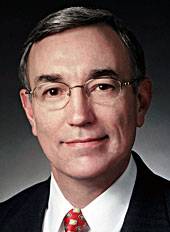AMES, Iowa -- Iowa State University is inviting state, industry, government and university leaders to develop policy and investment recommendations that would maintain Iowa's leadership in the bioeconomy.
The leaders will meet at Iowa State for "A Call to Action Summit: Ensuring Iowa's Leadership in the Bioeconomy." The summit will be 8:30 a.m. to 4:45 p.m. Tuesday, Nov. 28, in the Scheman Building. Registration is required and there is a $25 fee. See summit Web site.
"Iowa is the nation's clear leader in producing ethanol from corn," said Iowa State President Gregory Geoffroy. "But there is urgency for Iowa's leaders to start formulating policies and programs to ensure that Iowa continues its leadership into the era of advanced renewable fuels made from lignocellulose. It is dangerous to assume that Iowa's tremendous advantages as a corn producer will mean the state will still be the ethanol leader when renewable fuels are produced from plant fiber."
The Iowa State summit is designed to help state leaders position Iowa for the advancements and the opportunities ahead.
The summit's morning session will feature a keynote address by Geoffroy and remarks about "The Future of Biorefining in Iowa" by Robert C. Brown, the Iowa Farm Bureau Director of Biorenewables Programs at Iowa State; "Opportunities and Challenges of Growing the Bioeconomy in Iowa," by Ted Crosbie, the state's chief technology officer and Monsanto's vice president for global plant breeding; "Implications of Bioenergy on Agricultural Production," by Craig Lang, the president of the Iowa Farm Bureau Federation; and the "Economic and Social Impact of a Growing Bioenergy Industry on the State and their Policy Implications" by Bruce Babcock, the director of the Center for Agricultural and Rural Development at Iowa State.
Iowa's governor-elect will also be invited to speak about the potential impacts of the bioeconomy on the state.
The summit's afternoon session will feature working groups discussing biomass production, biorefineries, infrastructure and transportation, sustainability, the economic and social impacts on communities, consumer acceptance and balancing food and fuel production. Groups discussing each topic will develop policy ideas, funding recommendations and plans to work with the Iowa Legislature.
"This summit truly is a call to action," said John Brighton, Iowa State's vice president for research and economic development. "At the end of the day we expect to see policy ideas that will help sustain Iowa's grain ethanol and biodiesel industries while encouraging expansion into biorefineries that process plant fiber, funding recommendations that will assure the state's continued leadership in biobased products and plans to work with state lawmakers to make sure these recommendations are considered during the 2007 legislative session."
Other states are already considering policies and investments to encourage the growth of the biofuels industry. And so Geoffroy said it's time for Iowa to think ahead to the industry's next phase.
"We have taken the first steps in achieving our shared vision of Iowa sustaining its leadership in the emerging bioeconomy," he said. "It is imperative that we keep working to maintain our lead and the economic benefits that Iowa now enjoys."
